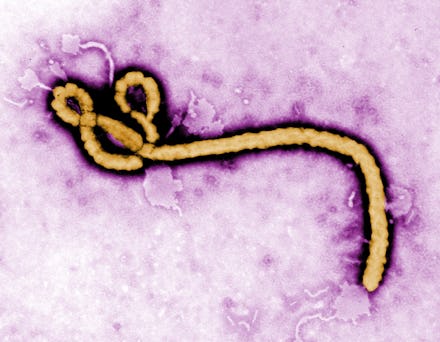The CDC Just Confirmed the First Case of Ebola in the U.S.

The Centers for Disease Control (CDC) confirms a Dallas patient has been diagnosed with Ebola, making this the first case of Ebola confirmed in the United States. WFAA-8 reports that the patient has been held in "strict isolation."
The Associated Press reported Monday evening that patient has been admitted to Texas Health Presbyterian Hospital after showing signs of the Ebola virus.
In a press conference Tuesday evening, the CDC confirmed that the patient traveled from Liberia to visit family in the U.S. on September 19, and developed symptoms on September 26. CDC Director Tom Frieden outlined the next steps for treating the disease and preventing its spread, including caring for the patient, identifying all the people who may have had contact with the patient and monitoring them for fever for 21 days.
Frieden repeated, "I have no doubt that we will control this case of Ebola so that it does not spread."
The CDC released a statement on the Texas diagnosis:
The person sought medical care at Texas Health Presbyterian Hospital of Dallas after developing symptoms consistent with Ebola. Based on the person’s travel history and symptoms, CDC recommended testing for Ebola. The medical facility isolated the patient and sent specimens for testing at CDC and at a Texas lab participating in the CDC’s Laboratory Response Network. CDC and the Texas Health Department reported the laboratory test results to the medical center to inform the patient. A CDC team is being dispatched to Dallas.
“Ebola can be scary. But there’s all the difference in the world between the U.S. and parts of Africa where Ebola is spreading. The United States has a strong health care system and public health professionals who will make sure this case does not threaten our communities,” said CDC Director, Dr. Tom Frieden, M.D., M.P.H. “While it is not impossible that there could be additional cases associated with this patient in the coming weeks, I have no doubt that we will contain this.”
This isn't the first time Americans have fretted the arrival of Ebola on U.S. soil. In August, 27-year-old Brooklyn grad student Eric Silverman was quarantined at Mount Sinai Hospital after complaining of symptoms that resembled the deadly Ebola virus. Silverman had traveled to Sierra Leone, where West Africa's Ebola outbreak has been the most pronounced and vivid, in July. The hospital eventually concluded that Silverman had avoided the infection and released him.
Additionally, Reuters also notes that while the West Africa epidemic "has overwhelmed regional health sectors still struggling to rebuild after years of civil war and turmoil," the U.S. won't have the same experience. The country's medical facilities, like Emory University Hospital (where two doctors infected with the virus were treated and released in August), are far better equipped to isolate Ebola before it becomes a full-scale outbreak. "The National Institutes of Health recently admitted an American doctor exposed to the virus while volunteering in Sierra Leone. Four other patients have been treated at hospitals in Georgia and Nebraska," the Associated Press reports.
Despite the fact that the U.S. is prepared to deal with the disease, Ebola is no picnic for even the most advances nations. The CDC recently projected that between 550,000 and 1.4 million people in West Africa could be infected with the deadly Ebola virus by Jan. 20, 2015, and that won't stay in West Africa. That state and federal agencies are exercising an abundance of caution — and Americas, an abundance of vigilence, is absolutely the right response.
Editors Note: Mar. 3, 2015
An earlier version of this article cited Associated Press reporting, but did not include quotations around the cited passage. The story has been updated to fully attribute the Associated Press' language.